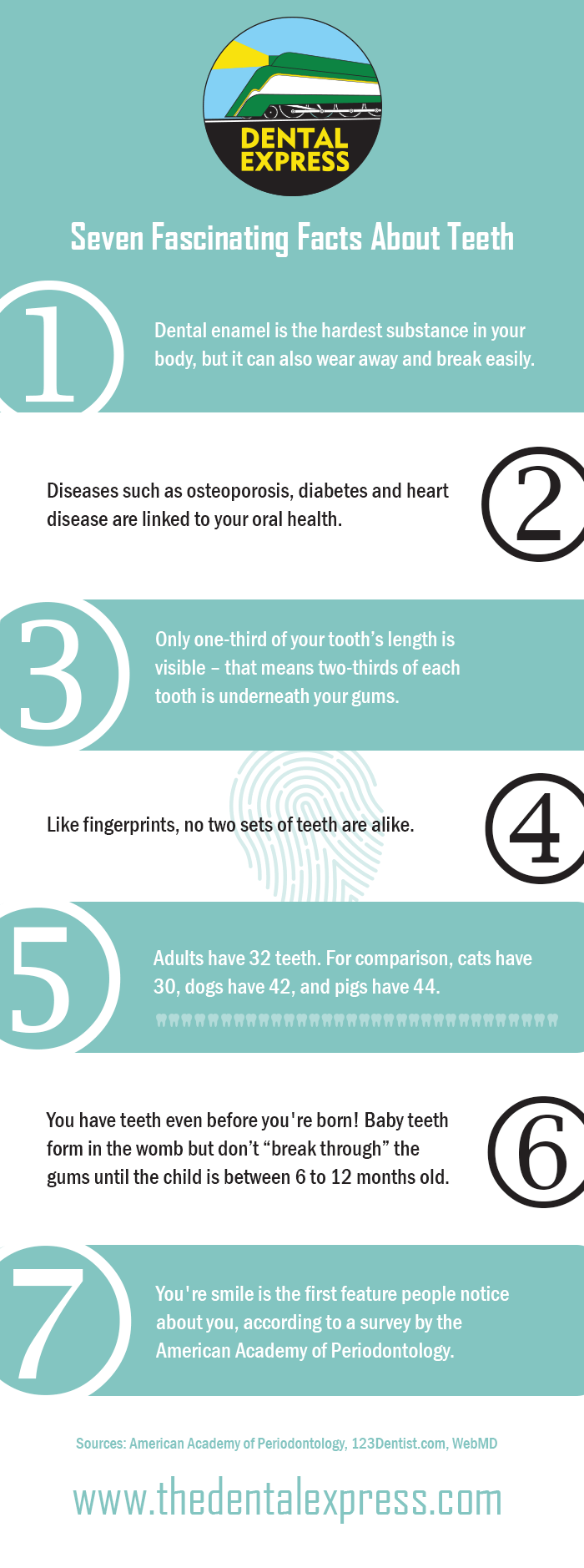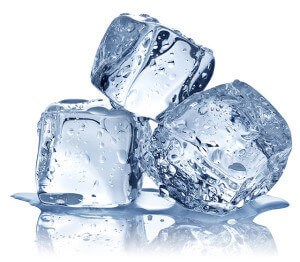Teeth Are Fascinating
How is your heart health linked to your oral health? What’s the hardest substance in your body? How do pig’s teeth compare to yours? Check out the answers to these questions and more in our fascinating facts infographic!

How is your heart health linked to your oral health? What’s the hardest substance in your body? How do pig’s teeth compare to yours? Check out the answers to these questions and more in our fascinating facts infographic!


Afraid of the dentist? Here are 4 tips to help you relax: Spiders. Germs. Heights. What do they all have in common? They are some of the most common phobias in the world. Those with arachnophobia panic at the sight of a spider. Someone with mysophobia continually washes his or her hands due to a fear of germs. Don’t expect someone with acrophobia – the fear of heights – to climb a ladder to change your light bulb.
But there’s another common phobia, and while you may have experienced it, you may not know its name. Dentophobia is a fear of the dentist. For many adults, this phobia can keep them from getting the medical help they need. A trip to the dentist can be intimidating. After all, there are whirring drills, lights, and sometimes, gum-numbing injections. For five percent of the population, this fear is so severe that their dental health suffers. In fact, according to Women’s Health Magazine, roughly 25 percent of those surveyed would prefer to never have a dental exam. This can lead to untreated tooth decay, which can, in turn, create a need for more intensive dental work. Before we review some tips to help you relax at the dentist, let’s look at the nature of a phobia. While it is perfectly natural to be leery of certain things (snakes, heights, spiders), those with phobias have such an extensive fear of these objects that it interferes with their daily life. Often, this phobia invokes a “fight or flight” response, which, in turn, can cause a panic attack. Frequent panic attacks may intensify the fear. Phobias can be caused by a traumatic event, unpleasant memories, or a previous upsetting experience. The good news is that relaxation techniques can help patients with dentophobia during a dental exam.
Researchers at the University of Gothenburg in Sweden studied dentophobia and found that there are several strategies patients can use to overcome their fear of the dentist:
Be aware that the longer you put off going to the dentist, the more involved your appointment may become. Untreated tooth decay can lead to other problems that may warrant a tooth root canal or tooth removal. Most important, let your dentist know about your fears. You are not alone, and you shouldn’t be embarrassed to discuss this phobia with your healthcare team. In many cases, they may be able to help you overcome or cope with this fear so you can get the dental treatment you need.
Sources: Chan, Amanda. “Dental Phobia: 7 Common Fears and How to Conquer Them.” Women’s Health. “The Top 10 Most Common Phobias, Ranked.” Cherry, Kendra “What is a Phobia?”

Are Your Teeth Healthy? Take our Quiz: Headlines across the country declare how unhealthy Americans are, and this information is not just limited to nutrition or weight. The National Institute of Health indicates that our dental health also leaves something to be desired. According to a recent study, 92 percent of adults ages 20 to 64 have had dental caries (cavities or tooth decay) in their permanent teeth. Even worse, approximately five percent of adults age 20 to 64 have no teeth at all. Studies indicate that families with higher incomes and those with higher levels of education actually had a higher incidence of tooth decay than those of other socioeconomic groups.
So how healthy are your teeth? We’ve created this quiz from information provided by the American Dental Association to give you some insight. Answer the questions below and score yourself accordingly.
Scoring:
If you didn’t do as well as you’d hoped, here are a few quick facts for you to consider:
Finally, it is difficult to ascertain your dental health if you haven’t had a regular dental checkup. Be sure to contact your dentist and schedule an appointment today. Your dentist can discuss the results of this quiz with you and help establish a plan for healthier teeth and gums.
Sources: National Institute of Health. “Dental Caries (Tooth Decay) in Adults (Age 20 to 64)” Information for quizzes from the American Dental Association. “Test Your Dental IQ.”

Five Surprising Things that Can Damage Your Teeth: Everyone has heard these time-honored pieces of dental advice:
But there are other pieces of advice with which you may not be familiar. For example, did you know that one of the most damaging things you can do to your teeth occurs while you’re sleeping? Following are five surprising things that you may not realize can damage your teeth.
Bruxism, which is another name for teeth grinding, can damage not only teeth, but the jaw as well. It occurs most often while sleeping. Speak with your general dentist about the possibility of a fitted mouth guard that can protect your teeth during the night.
Saliva is not just necessary to help break down food, it is also one of your tooth’s best friends. Saliva cleanses teeth to help prevent tooth decay and other dental problems. While everyone has dry mouth from time to time, certain medications can cause dry mouth. While the condition itself is not damaging, it places teeth at risk for developing cavities and other oral health problems. Tell your dentist if you’re experiencing dry mouth and provide a list of medications you are taking.
This habit can hurt tooth enamel and leave your teeth vulnerable to decay or other damage.
A diet in fruits and vegetables is an important part of a healthy lifestyle. However, too much exposure to acidic foods—particularly citrus fruits—can spell trouble. Not only can the acids in oranges and lemons wear away at enamel, but they can also agitate and irritate mouth sores.
We’re looking at you, popcorn, potato chips, and even white bread. Anything that transforms to a gummy consistency when chewed or has small pieces like popcorn husks can lodge between teeth, making it difficult to remove and setting the stage for tooth decay to take control. If you have any of these habits, put an effective action plan in place to help prevent tooth decay and damage that can result. For example: instead of chewing ice to cool down, drink water instead. Staying hydrated can also help you if you are suffering from dry mouth. Diligently flossing and cleaning teeth after eating popcorn or corn on the cob can help prevent pieces from getting stuck between teeth, where they can harbor bacteria. But most important, be sure you have a professional dental cleaning scheduled twice a year. If you have any questions concerning your dental health, speak to your dentist.
Dental Express gained national attention when we were featured on A&E’s Shipping Wars. Watch the short clip to see how our iconic train made it all the way from Las Vegas to San Diego in record time!

Would you know what to do if your child broke a tooth or had a Child’s Tooth knocked out while playing outdoors? Knowing what to do can lessen the pain and save a tooth that might otherwise be lost. Here are four tips to follow if your child experiences a knocked-out tooth:
We are always available to help with a dental emergency. Contact us at with any questions or to schedule a same day dentist appointment.